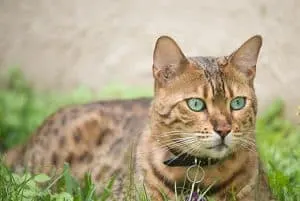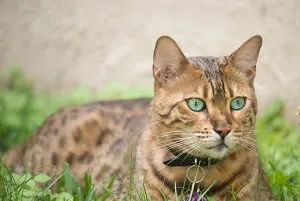 You’re sitting on the couch with your beautiful Bengal cat purring on your lap. The cat jumps up to explore, and as you admire their lovely color and rosettes, you look down at your lap and see…a puddle of drool? Gross! This can’t be right! Or can it? Are Bengal cats supposed to drool?
You’re sitting on the couch with your beautiful Bengal cat purring on your lap. The cat jumps up to explore, and as you admire their lovely color and rosettes, you look down at your lap and see…a puddle of drool? Gross! This can’t be right! Or can it? Are Bengal cats supposed to drool?
Drooling is common in certain cat breeds, including the Bengal. There are many reasons why drooling might occur, ranging from happiness to a severe medical problem. It is important to track when the drooling occurs in order to get a sense of what might be going on, and whether you need to take your cat to the vet.
It’s tough to know what to make of a drooling kitty. In this article, we’ll explore some of the possibilities to help you decide if your cat needs further examination or is just really in love with you!
Reasons Your Cat Drools
Cats, like humans, have salivary glands. However, while humans have three salivary glands, cats have five, serving primarily to assist with digestion and to protect the lining on the inside of the mouth. This means they can drool easily and that drooling can be a response to a wider variety of factors. Bengal cats, in particular, can begin to drool when they are waiting for food, especially if they are fed on a strict schedule and know that their meal is coming.
Many have heard of cats, “making biscuits.” This action refers to a cat kneading their owner, usually on the stomach, in an action that harkens back to kittenhood, when they would knead their mother’s belly to produce milk. If your Bengal does this, it should be interpreted as a sign of comfort and adoration. Cats are smart enough to know you’re not their mother, but this action is a loving one, and can also stimulate the salivary glands out of habit, causing drooling to occur.
Finally, your Bengal may drool out of pure happiness. Feeling relaxed, loved, and at home can trigger a drooling response as well. So if your Bengal cat is feeling especially happy that you’re its parent, the drool should be taken as a compliment, even if it is a little messy!
Is Cat Drooling Bad?
Unfortunately, drooling isn’t always a sign of hunger or happiness. Sometimes cat drooling can be a bad sign. Some bad, but easily corrected, reasons for drooling can include:
Fear
Apprehension and fear can make a cat nauseous, which can trigger drooling or even foaming at the mouth. Avoiding things that make your Bengal nervous will help curtail the drooling. There are also many calming products available like sprays, treats, and collars that can help your Bengal calm down in a situation where they might become upset.
Irritation to the mouth
If your cat has not drooled before and suddenly starts salivating everywhere, it’s time to take note. Bengals are curious, and especially if they have been outside, they might have eaten or licked something that irritated their mouth. Try to address the issue or figure out what might be causing the problem. If the issue persists, head to the vet.
Medications
Giving cats medication is no fun for anyone. To top it off, medications may cause drooling since they are bitter tasting. If the drooling only occurs when medication is given, it’s nothing to worry about. Just make sure your Bengal kitty has some water on hand!
Mild dental disease
Nearly 85% of cats experience some form of dental disease in their lifetime, with periodontal disease being the most common. Drooling can be a sign that your Bengal’s teeth are irritated and need to be cleaned. Severe dental issues can be avoided by getting in the habit of brushing your Bengal’s teeth regularly. Pet stores and many resources online sell special toothpaste for cats and toothbrushes that fit around your finger. While the cat may resist, brushing their teeth is a good way to ward off future dental complications, and can be done fairly quickly.
If you haven’t been brushing your cat’s teeth, it’s never too late to start! It’s important to know how to make tooth brushing at least moderately uneventful for you and your cat. This way they can enjoy the experience right along with you. It is recommended that your brush your cat’s teeth three times per week. Note: Don’t ever use human toothpaste on a cat!
Cats should have their teeth checked by a veterinarian at least once a year. Early detection of any dental issues can allow you to fight your Bengal’s disease, and perhaps help put an end to the drooling.
Other Reasons Your Cat May Be Drooling
Sadly, drooling in a Bengal cat can be the sign of something serious. You should plan to work with your veterinarian closely if your Bengal develops any of these issues:
Ingestion of a foreign body
If your Bengal’s curiosity really got the better of them, they may have tried to swallow something that is stuck in their mouth or throat. If the cat is drooling excessively and unsuccessfully attempting to vomit, it could mean they’ve got something stuck and should be taken to a professional immediately.
Moderate to severe dental disease
Once periodontal disease, gingivitis, and other oral diseases progress, they can become very painful for the cat and cause drooling. These diseases may require surgery or tooth extraction to correct.
Dental symptoms in reaction to systemic diseases
Drooling and dental symptoms can be the result of underlying issues. One of these is kidney disease, which Bengal cats are especially prone to getting. If your cat is drooling and also showing symptoms like frequent urination, drinking a lot of water, weight loss, or vomiting, kidney disease may be to blame. The drooling in response to this will come from mouth sores, which are also a common symptom of kidney disease.
Oral Cancer
Drooling may become very serious as a result of oral cancer in your Bengal. Sores from this cancer can develop anywhere in your cat’s mouth, including the gums, lips, tongue, jaw, or roof of the mouth. Your Bengal could need radiation therapies or surgery to attempt to cure the disease.
How do I know why my Bengal is drooling?
There is a wide range of potential reasons that your Bengal’s saliva could be flowing. The best thing to do is use your common sense, knowing that your veterinarian is there to answer any potential questions. Here are some questions you can ask yourself to evaluate the drooling:
● When does the drooling occur? Is it before meals or when I’m petting or holding my cat?
● Did the drooling come on suddenly, or has it been a long-term behavior?
● Could my Bengal have ingested or licked something?
● Is my Bengal stressed out about something, such as a car ride or visitors?
● Do I take care of my Bengal’s teeth regularly?
● Do I see any abnormal sores in my cat’s mouth?
● Is my cat exhibiting other symptoms like vomiting, refusing to eat, or frequent urination, in addition to excessive drooling?
Determining the behavior or external circumstances that are causing the drooling can help you to determine whether or not it is a cause for concern.
Final Thoughts
Bengals are lovely, curious, intelligent cats and a great addition to a family. But, like many breeds, they tend to drool. If your Bengal’s salivary glands are on overdrive, the best-case scenario is that your cat loves you like crazy! And, when you consider the alternatives, that’s not so bad, right? Just make sure to keep a towel nearby.

My name is James, and welcome to FAQCats!
Along with our team of cat owners, expert pet enthusiasts, and pet professionals, we aim to write engaging helpful, engaging content about cats. At FAQCats we strive to provide content that’s accurate and fun to read. Our team writes about everything related to cats; even the most complex of topics. Through extensive research and caring for our own fur-pals, we’re able to provide something cat owners worldwide will love. Have a look around, and leave us feedback anytime!

